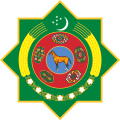History
In the 19th century, both nations shared a similar fate, with Eastern Armenia and Turkmen lands conquered by the Russian Empire. According to the 1897 census, there were 4,256 Armenians in the four southern uezds of the Transcaspian Oblast, roughly corresponding to present-day Turkmenistan. [1]
In 1990, following the Baku pogrom of Armenians, Saparmurat Niyazov received several ferries with Armenian refugees in Krasnovodsk. [2] Subsequently, the Baku Armenians were scattered across Turkmenistan. [3] Diplomatic relations were established on 9 October 1992. Armenia has had an embassy in Ashgabat since July 1994. [4] During the visit of President Sargsyan in early October 2014, the opening of Days of Culture of Armenia in Turkmenistan at the tourist zone of Awaza on the Caspian Sea coast. [5]
Cultural relations
Currently, there are about 25,000-30,000 Armenians living in Turkmenistan, with the most significant portion living in Ashgabat (around 15,000), Türkmenbaşy (around 5,000-6,000), and Mary (around 5,000-6,000). Others live in cities like Balkanabat, in Turkmenabat, and in Tejen. Armenians living in Turkmenistan mainly speak the Karabakh or Syunik dialects of the Armenian language, with most of them also being fluent in the Turkmen and Russian languages. One of the three Armenian Sunday schools in Turkmenistan, operates under the supervision of the Embassy of Armenia, with the other two being founded with the support of the Ministry of Diaspora Affairs. In 2014, an Armenian class was opened in Elotan, ceasing to operate by 2017. The only Armenian cultural cite in Turkmenistan is the now non-operational Church of Turkmenbashi, built in 1903. [6]
This page is based on this
Wikipedia article Text is available under the
CC BY-SA 4.0 license; additional terms may apply.
Images, videos and audio are available under their respective licenses.

